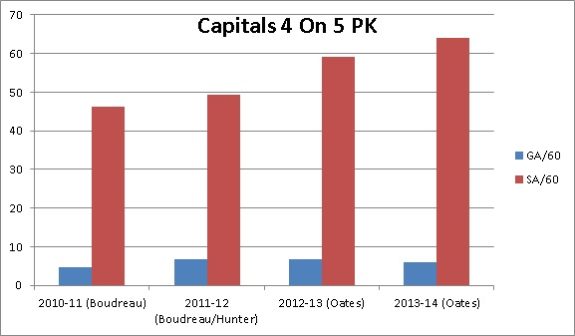Compared to their elite power play the Washington Capitals penalty kill isn’t a strong part of the team. They finished 16th in the NHL last season with an 82% success rate. There’s room for growth in that area due to their offseason additions on the blue line and potential improvement at the goalie position.
Their penalty kill was just a tick below the league average of 82.08% according to Sporting Charts and with the addition of goalie Justin Peters to backup Braden Holtby there’s a chance for growth in that department. The Capitals were shorthanded 284 times this past season, only Montreal, Winnipeg, St. Louis, Detroit, Los Angeles, Philadelphia, and Ottawa committed more penalties that led directly to power plays for the opposition.
Which Caps Defensemen Should Kill Penalties?
Their defensive pairings should be fairly simple and likely won’t change throughout the 2014-15 campaign. Mike Green and Dmitry Orlov don’t have the skillset to play big minutes on the penalty kill, leaving the pairings of former Penguins Matt Niskanen and Brooks Orpik along with the long time duo of John Carlson and Karl Alzner as Washington’s top two options when shorthanded.
Carlson (307:03) and Alzner (289:57) were the only Capitals defenseman to play over 100 minutes on the PK last season according to the NHL website. Expected healthy scratch John Erskine played the next highest amount on the penalty kill at 76:46. Jack Hillen is another blue liner on the Capitals depth chart that could fill in on the PK if one of Washington’s regular defensemen is out of the lineup. Of defenseman who played more than 200 minutes four on five last season, Alzner finished fourth in the league with .44 points per sixty minutes of play. Only Johnny Boychuck, Niklas Hjalmarsson and Dan Girardi were above Alzner.

In terms of shot suppression last season, the Capitals were the worst in the entire league. They allowed the most shots per sixty minutes of play, at 64.0. That’s below Florida’s 59.8 SA/60. Fortunately for Washington, the play in goal during four on five play saved them from being one of the worst penalty kills in the league. The Capitals finished third in save percentage (.904) during four on five play this season, only Pittsburgh and New Jersey had more success at stopping the puck in this noted situation. As noted in RMNB’s May article, you can see the success the three goalies had during the penalty kill this season, even with Braden Holtby’s struggles.
Making Forwards More Aggressive
One thing Barry Trotz should try to instill on the Capitals penalty kill this upcoming season is aggressiveness. They should look to force the opposing power play into making decisions, not vice versa. A lot of this depends on personnel. If the opposing power play has a defenseman at the point who has a dangerous shot, having a forward stay near to force the player to make a pass should happen. Some teams have shaded Washington Captain Alex Ovechkin in hopes that it will force another Capital on the man advantage to making a play.
Out of all NHL forwards that played over 100 minutes of four on five play shorthanded, Jason Chimera, Brooks Laich and Troy Bouwer finished in the seven out of 114 qualified players in shots allowed per 20 minutes. Brouwer finished dead last allowing 23.675 shots per 20 minutes.
The personnel will stay the same for the most part, with Joel Ward, Chimera, Laich and Brouwer getting the majority of the shorthanded minutes. Jay Beagle and Michael Latta could also see some time on the penalty kill if the sneak themselves into the lineup.
The duo of Holtby and Justin Peters is going to provide stability in net that should keep the Capitals ability to stop the puck on the PK close to what it was during the 2013-14 season. The addition of two top four defensemen who can play shorthanded should be help as well.

Getting the forwards to adapt to a potential scheme change on the penalty kill could do wonders for the Capitals next season. An aggressive system could lead to more offensive opportunities when shorthanded, Washington finished last season with just five shorthanded goals. The penalty kill and power play should be strengths of the Capitals next season; fixing five-on-five play is the biggest challenge for Barry Trotz in his first year at the nation’s capital.